
 My favorite novel of all time is Nobel House by James Clavell.
My favorite novel of all time is Nobel House by James Clavell.
It is a masterpiece of storytelling that brilliantly weaves multiple complex storylines and fictionalized historical events into a highly entertaining story. I've read it at least ten times. But Nobel House, a story of modern Hong Kong circa 1963, is but one piece of Clavell's sprawling "Asian Saga" which includes his far more popular and well-known work, Shōgun...
Most people familiar with Shōgun know it from the 1980 five-episode mini-series event starring Dr. Kildare himself, Richard Chamberlain. So far as mini-series of the day go, it was pretty good. A fair amount of money was injected into the project, so it had good production values and a skilled cast. Here in the USA, it was a cultural phenomenon that was well-received. In Japan, however... well... it was a fictional accounting of their very real history, so it was not well-received at all. And understandably so. I mean, just look at this nonsense...
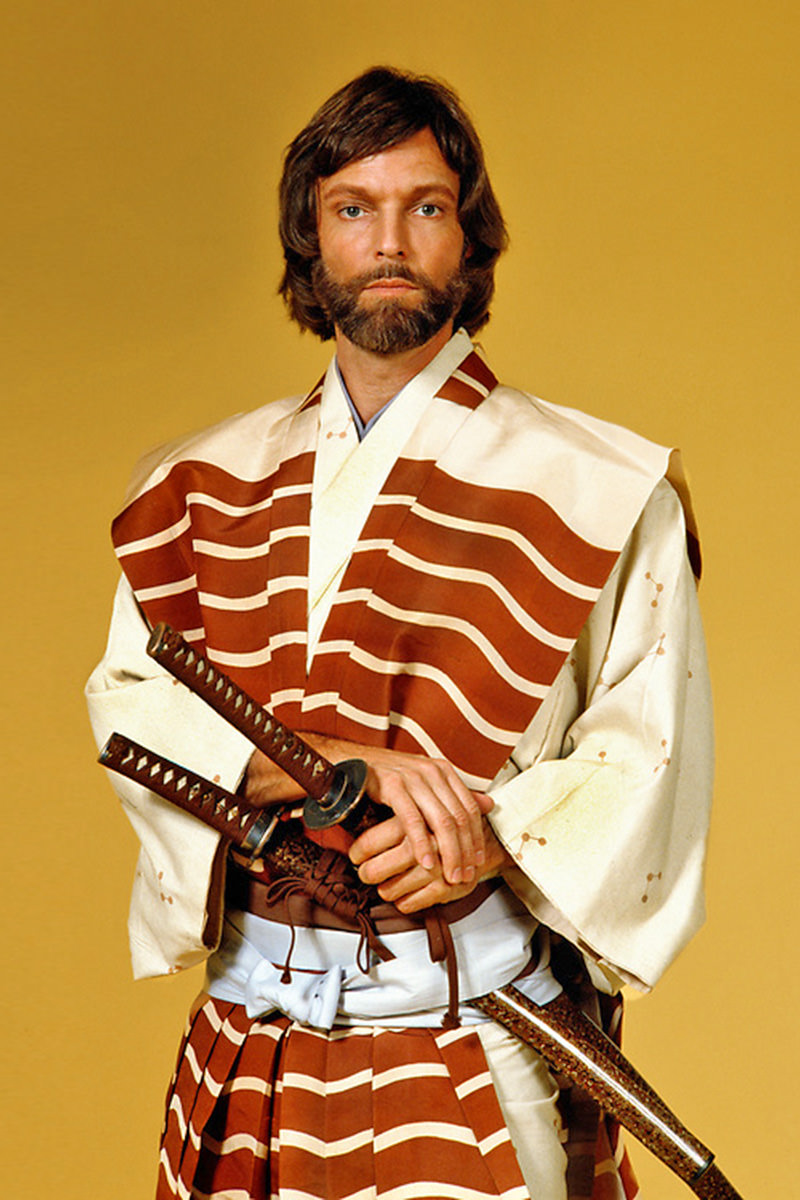
At the time I was mesmerized by the series. I think it was my second "event" mini-series after Roots, and I anxiously awaited each installment. And then I started reading the Clavell books (of which only King Rat, Tai-Pan, and Shōgun had been written). Then the following year in 1981 Nobel House was released and my literary world was turned upside-down.
But anyway...
FX Networks (via Hulu) has now begun a new 10-part adaptation of the novel. Gone is the over-the-top acting style of the 1980's, replaced by more reserved and powerful performances. Japanese is subtitled Japanese (thank heavens) and Portuguese is depicted with English so that the entire series doesn't have to be subtitled. In some ways the production feels a bit more intimate than the excessive 1980 series but not in a bad way. You still get the glorious money shots to establish scale (visual FX makes possible was could never have been realized 24 years ago), and the sets have authenticity which makes it a pleasure to watch. It's just that the focus is more on the performances than the spectacle. The first two episodes aired last night, and now we're getting a new one each week...
Taking place as the Edo period of Japan's history was being born, the world of Shōgun is truly bizarre by Western standards. An English guy ending up shipwrecked there at the time would very likely have gone mad. Violence and death was commonplace and intricately linked to a social caste system and honor code which is incredibly difficult for foreigners to even begin to grasp. Layer upon that the complex politics of pre-Edo, feudal Japan and it's amazing that Clavell managed to figure out a way of setting a story there that could be understood by Westerners to begin with. But set it there he does, and it's made even more complex because you have to understand the geo-politics in Europe as well. The English Protestants against the Portuguese Catholics who controlled trade in Asia.
The new FX series does a pretty good job of hand-holding the viewer through all of it, carefully dropping bits of exposition in a way that's not offensively obvious nor mind-numbingly boring. By the end of the second episode, you're pretty much set (which is probably why they were released at the same time) which means that the remaining eight episodes will be a ramp up to the heart of the story.
Now, when it was announced years ago that an adaptation was being made, I was really, really hoping for Michiel Huisman to play Pilot Major John Blackthorne. The character is English and Huisman is Dutch, but of all the actors working at the time of the announcement, he was the one I felt could best embody the character (driven mainly by his work on Game of Thrones). Ultimately the role would go to Cosmo Jarvis, who I was unfamiliar with. The guy does a phenomenal job with the part, which is great given that the entire show hinges on his performance. He has a very fine line to walk in the earlier episodes as he adjusts to the world around him but handles it with ease. Another standout is Tommy Bastow playing the Portuguese priest Father Albito. Despite him being an "enemy," you want to like him, which is critical to his role. Of course all of the Japanese parts are very well cast.
Especially Mariko.
Anna Sawai I actually recognize from, of all places, Fast and Furious 9 (more recently she was in Monarch: Legacy of Monsters). Near the end of the second episode her character has to hear some incredibly shocking news and then deliver it to her Lord Toranaga. But she has to be very Japanese about it, showing neither shock nor surprise... all while being totally shocked and surprised. And you read it all on her face. It's thrilling to watch.
So... yeah... so far so good, and I'm giving the show my highest possible recommendation. Knowing where the story is headed has me excited about future episodes, and I am almost certain to sit down and binge the whole thing over a weekend after finishing the final piece.
Can't give you more of an endorsement than that!
 My favorite novel of all time is Noble House by James Clavell. It's a story of contemporary 1960's Hong Kong that weaves a fictional story with actual history in a way that only the author of Shōgun could manage. It's beautifully realized, filled with dozens of interesting characters and locations. It's remarkably complex, having several intertwined plot threads and story elements. It's richly satisfying, overflowing with tiny details that come together in fascinating ways (I've read it over a dozen times, and still feel like I'm missing something). To me, Noble House is about as close to perfect as a book can get...
My favorite novel of all time is Noble House by James Clavell. It's a story of contemporary 1960's Hong Kong that weaves a fictional story with actual history in a way that only the author of Shōgun could manage. It's beautifully realized, filled with dozens of interesting characters and locations. It's remarkably complex, having several intertwined plot threads and story elements. It's richly satisfying, overflowing with tiny details that come together in fascinating ways (I've read it over a dozen times, and still feel like I'm missing something). To me, Noble House is about as close to perfect as a book can get...
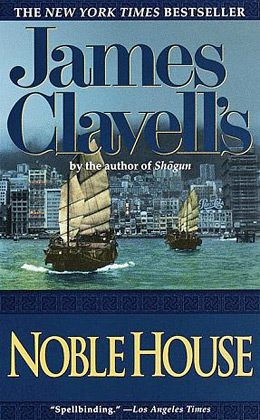
For the most part, people either love the book or hate it. The people who hate it usually end up griping about it's high page count or complexity, which I immediately dismiss. Mostly because I think it's funny how people choose to review a book by saying they were too lazy or stupid to get into it, but I'm judgmental like that. Other negative comments I've read make no sense. My favorite "review" of Noble House ever written is this one...
"The weakest of Clavell's Japan novels. I didn't enjoy it near as much as Centennial and Tai Pan, but still rich history, characters and plotting as well as the usual healthy dose of foreign culture. This one takes place in modern Japan."
The reason it's such a great review is that the book takes place in Hong Kong not Japan (as did Tai-Pan). And, though "modern" is subjective, it takes place in the 1960's. Furthermore, the book Centennial was written by James Michener not James Clavell (who wrote The Asian Saga... not "Japan novels"). Did this dumbass even bother to read the book, or did he just review it sight-unseen so he could look smart? We may never know.
Eventually the book was made into a television mini-series starring Pierce Brosnan. They moved the story from the 1960's to the 1980's and jettisoned dozens of plot points, but it was still darn fine entertainment...
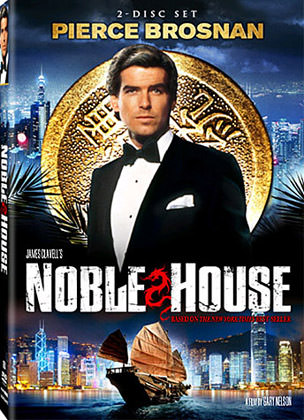
Anyway... the reason that this novel has been on my brain today is because we've got Hurricane Irene happening on the east coast, and Noble House opens up with a "tai-fun" (typhoon, or "supreme wind").
When I first read the book decades ago, I remember wondering how a typhoon is different from a hurricane and how both are different from a cyclone.
Turns out they're all pretty much the same, it's the location which determines what we call a massive tropical storm in English...
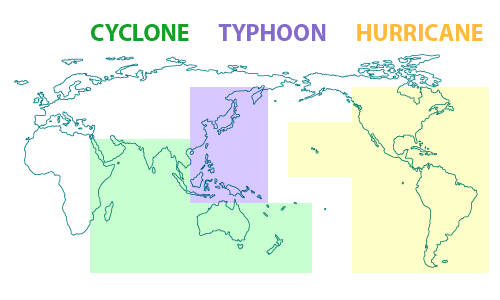
It's not a perfect map, of course... but it basically boils down like this: Historical British colonial regions like India and Australia use "Cyclone." The Americas use "Hurricane." Asia uses "Typhoon." There are variations on all those. And, of course, local languages have many different names in their native tongues.
My thoughts are with those in the path of Hurricane Irene. Indeed, it's difficult to think of much else.
Stay safe everybody.
Noble House on Apple's iTunes Book Store — Noble House on Amazon's Book/Kindle Store
 After two weeks of non-stop travel torture, I'd like nothing better than to take a handful of pills and sleep all day. But we can't have that... it's Bullet Sunday!
After two weeks of non-stop travel torture, I'd like nothing better than to take a handful of pills and sleep all day. But we can't have that... it's Bullet Sunday!
• Violence. I was deeply saddened to hear of the bomb attacks on the wonderful island of Mallorca. Having fallen in love with the place earlier this year, it's a nasty reality check... much like the Bali bombings of 2002. I gave up a long time ago trying to understand what motivates somebody to harm innocent people, but that doesn't help quell the frustration I feel every time something like this happens. I'm wondering exactly what kind of global disaster is going to have to occur before mankind can put this kind of self-destruction behind them and move forward together. Hopefully it will be a disaster that's survivable, because there's too many beautiful things here worth being appreciated...
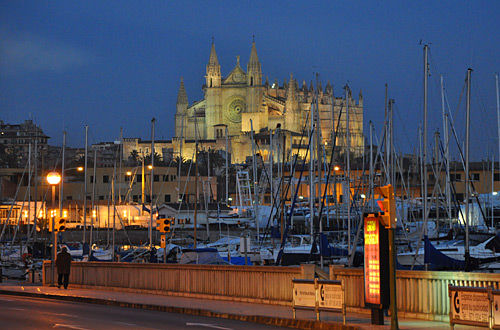
• Dreaming. Unlike most people, my dreams are no fun. That's because, unlike most people, I can never get lost in a dream like it's some kind of fantasy world I'm inhabiting. Oh no. When I dream, I know I'm dreaming. It's hard to explain, but it's like I'm looking AT a movie of myself rather than actually being IN the movie. So, for me anyway, dreams are not an escape... but instead badly-written entertainment. But lately my dreams have become something... different. I still know I'm dreaming, but I'm inside the dream rather than merely an observer. While not as much fun as most people's dreams, it's definitely a step in the right direction. And what am I dreaming of lately? Alpamayo Mountain. And I have no idea why. I've never been there. I barely know it exists. And yet, there it is, night after night...
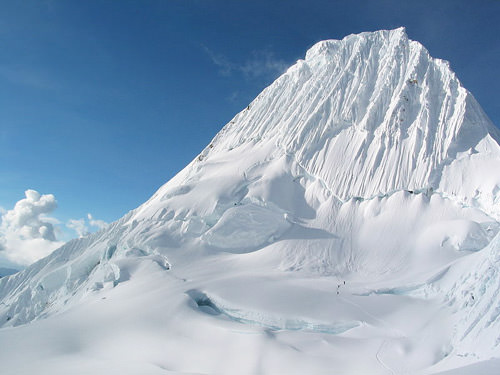
Astounding photograph by Brad Mering.
Maybe I'm supposed to go there? Or maybe I just enjoy the scenery? I dunno, but it is a lovely mountain.
• Noble House. My favorite novel of all time is Noble House by James Clavell. I have read it several times, and enjoy it more with each reading. I own four editions of the book, and see that there's a new over-sized paperback edition that's been released, so I'll be owning a fifth soon. There's just something about the numerous sub-plots that combine to create an epic, lengthy, brilliant masterpiece that I can't get enough of...

MEANWHILE... somebody read my Hundred Things where I mention that Noble House is my favorite book, and decided to write and tell me that if this was my favorite then I was "stupid." I was then given a list of other books which, in his not-so-humble opinion, were vastly superior. Including such classics as Catcher in the Rye, The Grapes of Wrath, and anything by Hemingway. Usually, I just delete stupid-ass emails like this without a second thought, but instead decided to write back and ask what it was about Noble House that he didn't like. Was it too long? Did he think it was too complex? Did he not like the Asian setting? What? He wrote back the next day and said that he hadn't read Noble House and that he didn't need to read it to know that it was not deserving to be anybody's favorite book when there were such obvious better choices out there.
Yes. I'm the stupid one in this scenario.
• Kitty. Tim Burton movies are pretty much hit-or-miss with me. The quirkiness that he infuses into his projects make them unique, but sometimes he goes too far and I can't get into the film. His latest movie Alice in Wonderland, however, seems to be a perfect outlet for his talents. There's plenty of crazy stuff in the original Lewis Carroll tale for him to build upon in his "sequelesque" story. And just seeing his treatment of the Cheshire Cat is enough to make me want to see it...
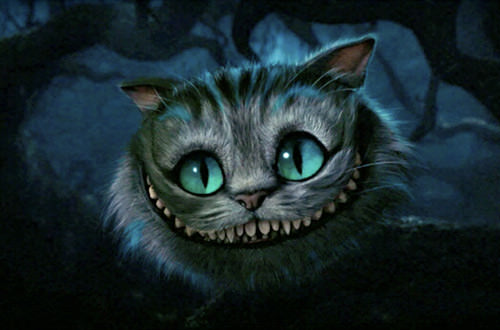
If nothing else, it's going to provide a whole new level of stupid LOLCat jokes.
And that's all she wrote this Sunday, because now it's time for The Comedy Central Roast of Joan Rivers! It's not that I think the roasting itself is going to be that much of a challenge... Joan Rivers is an easy target... but hearing Joan fire back at her roasters at the end should be great fun.
